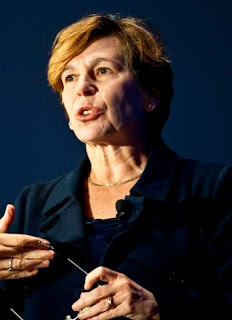Marilyn Achiron: To what extent do you look to international examples for improving teaching performance? To what extent is that important to you?
Randi Weingarten: Good practice and what works knows no geographic boundaries. We should be looking for it wherever we find it. To borrow somebody else’s expression, the world has become more and more flat, more and more accessible, more and more global. Therefore, in some ways, geographic boundaries mean very little in the economic system of the world. When you know that, then you have to look around the world to see what is working, how to innovate, how to ensure that kids have the skills that they need so that they can compete, or at least so that they can be enabled not simply to dream their dreams, but to achieve them. So whether you think about it from a process standpoint, in terms of what is working in education; or you think about it from an economic standpoint, in terms of what the world has become; or whether you think about in terms of a child’s standpoint, in terms of how do we enable kids to become successful in the world in which they will find themselves, we have to be internationalists, not isolationists. That is what the OECD’s work is about.
MA: Given the economic morass we’re in, and given that, in most OECD countries, societies are aging, is there the risk that teachers’ unions will become marginalised in the next few years? What can be done to maintain their relevancy?
RW: I think the fight about relevancy has been happening over the last two years. We have to win that fight if we believe that voice and democracy is important for societies to prosper and if we believe that education is essential for a society to be a good society. There are lots of people who look at the world and think about it as a race to the bottom. They think: “the only way we can compete is to ensure that we pay the least amount for the most amount of goods”. And that way of viewing life means that each successive generation is going to do worse than their parents did. That is antithetical to what we always believed was the American dream; and it is, frankly, antithetical to the whole notion, seen all across the world, that if you work hard then you are going to do better than your parents did; and that your kids are going to do better than you did. What the labour movement has always been about, whether it is the teachers’ unions or other unions, is about the dignity of work, is about ensuring that work garners with it a good wage and some security. It is not a free lunch, not a free ride. If one actually believes that our best days ought to be ahead of us, then you have to believe in the social and economic engines that help us get there; and the labour movement is one of those engines.
What’s interesting is that this time of economic morass has created another Gilded Age. There are some people who are doing quite well; and the gap between rich and poor has grown greater than it has ever been. But if we don’t create a sense of who are the engines that will help propel the world to greater things in the decades to come, that will help solve the world’s real problems, whether they are economic or environmental, if we just throw our hands up and give up, then the world will be a very different place.
One of most hopeful things I’ve seen in the last few years is the effect PISA has had. The effect has been to open a window on what works to educate youngsters across the world. It is not simply having results that say Country A is outperforming Country B. What the OECD has done and the data and analysis has shown is why certain countries outperform others. And that is one of the most valuable pieces of work we can have: a path to the key attributes to long-term, systemic, scalable change so that we help all kids succeed.
The conversation with Randi Weingarten will continue in a forthcoming post.
Links
Programme for International Student Assessment (PISA)
Trade Union Advisory Committee to the OECD (TUAC)
American Federation of Teachers
Photo credit: Ilene Perlman
You have read this article PISA OECD teachers globalisation democracy teachers' unions economy equity youth United States
with the title November 2011. You can bookmark this page URL http://clutteredeclecticmind.blogspot.com/2011/11/internationalist-not-isolationist.html. Thanks!






--purple-for-blog-(no-note).jpg)


--purple%2520blog-2a.jpg)




